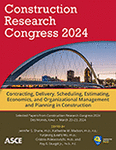Identifying Elements for Lean Construction Implementation in Trade Contractor Organizations
Publication: Construction Research Congress 2024
ABSTRACT
Lean practices and initiatives can substantially benefit the construction industry, but the implementation level by trade contractors is lagging. This is partially due to a lack of awareness of potential methods that can be employed by trade contractors, as well as a lack of tools to assist them in realizing their current level of lean implementation. The effectiveness of lean implementation in trade contractors cannot be improved without understanding the current state of its adoption. Several maturity models have been developed to assess lean adoption for organizations and general contractors; however, none has been created for the trade contractor community. Trade contractors execute most of the production tasks on construction projects; thus, they should benefit the most from lean adoption. This paper identifies 15 elements for lean construction implementation by trade contractors using literature review of existing lean construction maturity models and lean construction project implementation.
Get full access to this article
View all available purchase options and get full access to this chapter.
REFERENCES
Asadian, E., Leicht, R., and Messner, J. (2021, May). Lean adoption barriers for trade contractors. In Canadian Society of Civil Engineering Annual Conference (pp. 211–223). Singapore: Springer Nature Singapore. https://doi.org/10.1007/978-981-19-0968-9_17.
Asadian, E., Leicht, R. M., and Messner, J. I. (2022). Lean Adoption for Trade Contractors: Benefits, Barriers, and Path Forward. In Construction Research Congress 2022 (pp. 932–942).
Ballard, G., Tommelein, I., Koskela, L., and Howell, G. (2007). Lean construction tools and techniques. In Design and construction (pp. 227–255). Routledge.
Cano, S., Botero, L., García-Alcaraz, J. L., Tovar, R., and Rivera, L. (2020, July). Key aspects of maturity assessment in lean construction. In Proceedings of the 28th Annual Conference of the International Group for Lean Construction (pp. 229–240).
Comelli, M. L., Veras de Carvalho, Y. M., Marinho, R. C., Candido, L. F., and Barros Neto, J. P. (2019). Assessing the level of implementation of lean construction: An audit protocol. In Proc. 27th Annual Conference of the International. Group for Lean Construction (IGLC), Pasquire. C, and Hamzeh, FR.(ed.), Dublin, Ireland (pp. 999–1022).
Diekmann, J. E., Balonick, J., Krewedl, M., and Troendle, L. (2003, July). Measuring lean conformance. In Proc. 11th Ann. Conf. Intl. Group for Lean Construction (Vol. 102, pp. 2–8).
Etges, B. M., Saurin, T. A., and Bulhões, I. R. (2012). Identifying lean construction categories of practices in IGLC. In Proceedings of the 20th annual conference of the international group for lean construction, international group for lean construction (IGLC). Norway: Oslo.
Fernandez-Solis, J. L., Porwal, V., Lavy, S., Shafaat, A., Rybkowski, Z. K., Son, K., and Lagoo, N. (2013). Survey of motivations, benefits, and implementation challenges of last planner system users. Journal of construction engineering and management, 139(4), 354–360.
Hinze, J., and Tracey, A. (1994). The contractor-subcontractor relationship: the subcontractor’s view. Journal of construction engineering and management, 120(2), 274–287.
Hofacker, A., Oliveira, B. D., Gehbauer, F., Freitas, M. D. C. D., Mendes Júnior, R., Santos, A., and Kirsch, J. (2008, July). Rapid lean construction-quality rating model (LCR). In 16th International Group for Lean Construction Conference (IGLC16) (pp. 1–11).
Howell, G. A. (1999, July). What is lean construction-1999. In Proceedings IGLC (Vol. 7, p. 1). Citeseer.
Khan, M. A., and Leicht, R. (2022, July). Categorization of Construction Tasks for Robotics Using Lean vs Value-Added Effectiveness Framework. In Annual Conference of the International Group for Lean Construction.
Koskela, L., Howell, G., Ballard, G., and Tommelein, I. (2007). The foundations of lean construction. In Design and construction (pp. 211–226). Routledge.
Leicht, R. M., Messner, J. I., and Asadian, E. (2023). A Comparative Analysis of Continuous Improvement Approaches Among Trade-Contractors.
Li, S., Wu, X., Zhou, Y., and Liu, X. (2017). A study on the evaluation of implementation level of lean construction in two Chinese firms. Renewable and Sustainable Energy Reviews, 71, 846–851.
Liker, J. K. (2004). The Toyota way: 14 management principles. McGraw-Hill.
Mohamed, A. H. (2021). An assessment tool to measure the lean construction maturity level. In Collaboration and Integration in Construction, Engineering, Management and Technology: Proceedings of the 11th International Conference on Construction in the 21st Century, London 2019 (pp. 15–19). Springer International Publishing.
Nesensohn, C., Bryde, D., Ochieng, E., and Fearon, D. (2014). Maturity and maturity models in lean construction. Australasian Journal of Construction Economics and Building, The, 14(1), 45–59.
Nesensohn, C., Bryde, D. J., and Pasquire, C. (2016). A measurement model for lean construction maturity. Lean Construction Journal, 1–9.
Paulk, M. C., Curtis, B., Chrissis, M. B., and Weber, C. V. (1993). Capability maturity model, version 1.1. IEEE software, 10(4), 18–27.
Sainath, Y., Varghese, K., and Raghavan, N. (2018, July). Framework for progressive evaluation of lean construction maturity using multi-dimensional matrix. In Proceedings of the 26th Annual Conference of the International Group for Lean Construction (IGLC).
Salem, O., Solomon, J., Genaidy, A., and Luegring, M. (2005). Site implementation and assessment of lean construction techniques. Lean construction journal, 2(2), 1–21.
Thomas, H. R., and Ellis, R. D., Jr. (2017). Construction site management and labor productivity improvement: How to improve the bottom line and shorten the project schedule.
Urban, W. (2015). The lean management maturity self-assessment tool based on organizational culture diagnosis. Procedia-Social and Behavioral Sciences, 213, 728–733.
Womack, J. P., and Jones, D. T. (1996a). Beyond Toyota: How to root out waste and pursue perfection. Harvard business review, 74(5), 140–151.
Womack, J. P., and Jones, D. T. (1996b). Lean Thinking, Simon and Schuster. New York, NY.
Information & Authors
Information
Published In
History
Published online: Mar 18, 2024
Authors
Metrics & Citations
Metrics
Citations
Download citation
If you have the appropriate software installed, you can download article citation data to the citation manager of your choice. Simply select your manager software from the list below and click Download.
